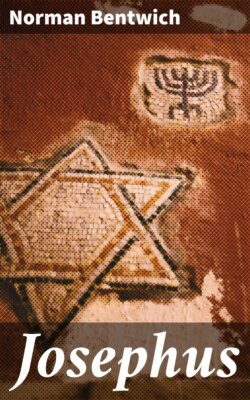Читать книгу Josephus - Norman Bentwich - Страница 3
На сайте Литреса книга снята с продажи.
PREFACE
ОглавлениеTable of Contents
Josephus hardly merits a place on his own account in a series of Jewish Worthies, since neither as man of action nor as man of letters did he deserve particularly well of his nation. It is not his personal worthiness, but the worth of his work, that recommends him to the attention of the Jewish people. He was not a loyal general, and he was not a faithful chronicler of the struggle with Rome; but he had the merit of writing a number of books on the Jews and Judaism, which not only met the desire for knowledge of his nation in his own day, but which have been preserved through the ages and still remain one of the chief authorities for Jewish history. He lived at the great crisis of his people, when it stood at the parting of the ways. And while in his life he was patronized by those who had destroyed the national center, after his death he found favor with that larger religious community which was beginning to carry part of the Jewish mission to the Gentiles. For centuries Josephus was regarded by the Christians as the standard historian of the Jews, and, though for long he was forgotten and neglected by his own people, in modern times he has been carefully studied also by them, and his merits and demerits both as patriot and as writer have been critically examined.
It has been my especial aim in this book to consider Josephus from the Jewish point of view. I have made no attempt to extenuate his personal conduct or his literary faults. My judgment may appear somewhat severe, but it is when tried by the test of faithfulness to his nation that Josephus is found most wanting; and I hope that while extenuating nothing I have not set down aught in malice.
Of the extensive literature bearing on the subject, the books to which I am under the greatest obligation are Niese's text of the collected works and Schürer's History of the Jewish People in the Time of Jesus. I have given in an Appendix a Bibliography, which contains the names of most of the works I have referred to. I would mention in particular Schlatter's Zur Topographie und Geschichte Palästinas, which is a remarkably stimulating and suggestive book, and which confirmed a view I had formed independently, that in the Wars, as in the Antiquities, Josephus is normally a compiler of other men's writings, and constantly expresses opinions not his own.
My greatest debt of thanks, however, is due to the spoken rather than the written word. Doctor Büchler, the Principal of Jews' College, London, has constantly assisted me with advice, directed me to sources of information, and let me draw plentifully from his own large stores of knowledge about Josephus; and Doctor Friedlaender, Sabato Morais Professor at the Jewish Theological Seminary of America, has done me the brotherly service of reading my manuscript and making many valuable suggestions on it. To their generous help this book owes more than I can acknowledge.
